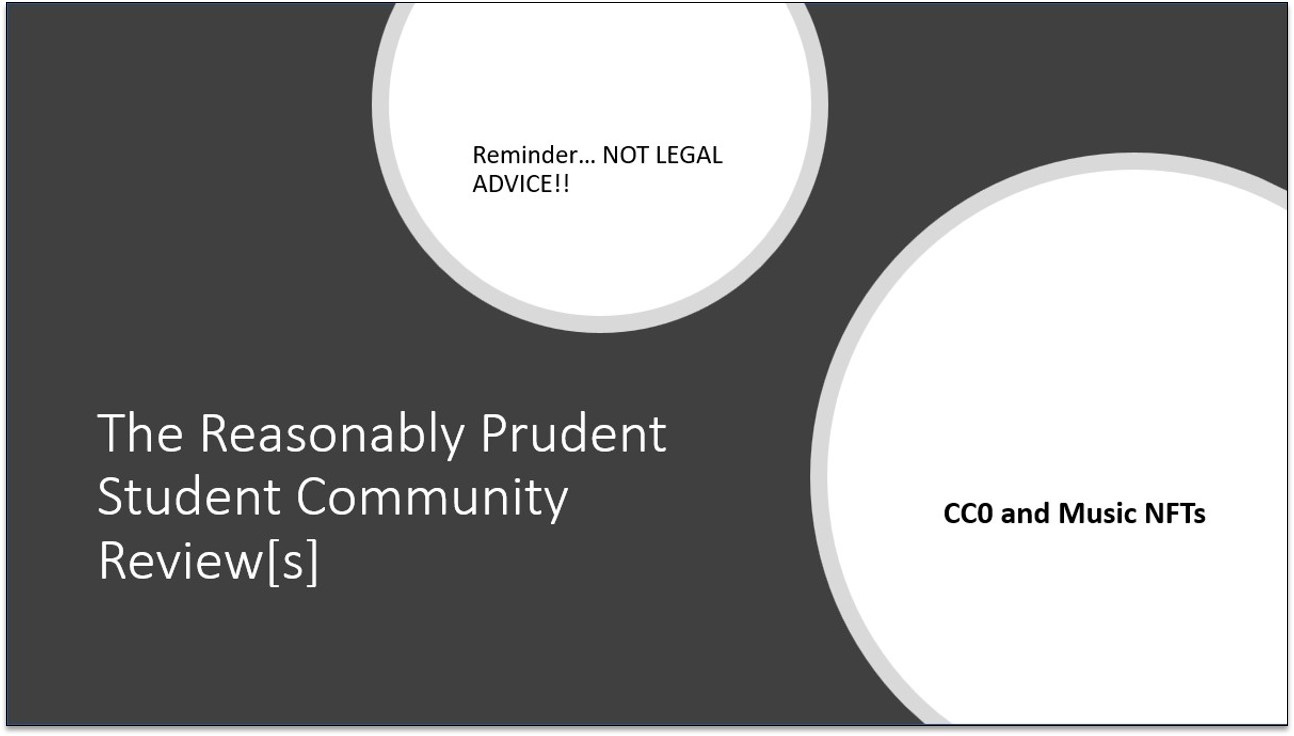Edition No. 3
They say a news week in crypto is equal to six months in any other industry. Here's what happened from 5/16/22 - 5/22/22.
Welcome to another edition of Around the Blockchain, a weekly letter dedicated to keeping readers like you up to date on the fast-paced world of Crypto & Law by airdropping current stories and projects directly to your browser.
On the Docket
Five things you might have missed last week
1. U.S. Rule Makers Vary Greatly in Their Approach to Crypto
The Winds of Change
A wide range of opinions, proposals, and commentary this week in regards to how the U.S. should and will be approaching crypto rules in the coming months and years. Government dignitaries such as Janet Yellen, Senators Lummis and Gillibrand, as well as spokespeople for the CFTC and SEC, all made significant comments and/or took action related to establishing the country’s crypto rules this week. As could be expected from the variety of authorities involved, the outcomes vary quite significantly depending on who’s proposing them.
2. Differences Of Opinion in Central & South American Crypto Adoption
Sticks & Carrots // Hares & Horses
Panama’s president balks at signing crypto legislation; El Salvador continues to hurt with the decline in Bitcoin price; Brazil gets closer to adopting crypto regulation; and Argentina launches Bitcoin education programs in 40 schools across the country.
3. NFTs Have Their Day[s] In Court
Stare Decisis a la NFT
It was a busy week in the world of NFT litigation and legal matters. Universal Music Partnered with Limewire to launch NFTs on the resurrected file sharing platform, Opensea disabled sale of a Bored Ape amid ongoing litigation in Singapore, Jay-Z resumed his NFT lawsuit against former Roc-A-Fella exec, and the Judge in the Hermes NFT case released a decision denying a motion to dismiss.
4. Key Members of Terraform Labs’ Legal Team Resign After LUNA UST Collapse
Two Weeks Notice:
Following the monumental collapse of the Terra Blockchain Stable and Burn tokens (UST & Luna, respectively), General Counsel Marc Goldich, Chief Corporate Counsel Lawrence Florio, and Chief Litigation and Regulatory Counsel Noah Axler have all elected to resign. Terraform Labs legal operations have since been delegated to outside counsel. As investigations into the collapse of the chain and founder Do Kwon continue to unfold, it appears the challenge and adversity that lay ahead was simply too steep for the attorneys mentioned above.
5. Crypto-Crash Tax Losses (Might Be) Subject to a $3,000 Cap
Death & Taxes
After what was for many crypto investors a tough week, public discourse on social media sites erupted into debate over just how much of a loss could be written off on one’s taxes. The IRS has offered little guidance, but did refer to Notice 2014-21 on a FAQ board, writing, “when you sell virtual currency, you must recognize any capital gain or loss on the sale, subject to any limitations on the deductibility of capital losses.” According to Steve Howell of Heckard & Howell CPAs:
“As I see it, the capital loss limitation is set in stone, and I doubt digital currency would receive an exception carve-out going forward.”
There may be a small silver lining, however, for investors who experienced near total losses such as those of the UST collapse, with “Abandonment Loss” filings allowing for complete tax benefit reclamation.
See also: Tax Your Crypto and NFTs? Yes, the IRS Wants Its Cut
The Public Ledger
Web-3 regulatory and legal news from around the world. Always DYOR - but in case you don’t have time - here’s some of ours.
General News and Opinion
Potential Crypto Gift Tax Exemption From US to French Resident
Crypto industry wields its influence in Washington after pouring over $30 million into campaigns
The World was Not Quite Ready for a Crypto Implosion, Lawyers in Asia Even Less So
Polsinelli Must Face Legal Malpractice Suit Over Old Crypto Club
Coinbase launches new crypto think tank to help shape policies
U.S. - Federal
Commerce Department Seeks Public Comment on US Crypto Framework
Arthur Hayes faces up to five years in his Friday sentencing, but jail time is unlikely
SafeMoon Crypto Investors Bring Another Class Action Fraud Suit
Biden Administration Wants Crypto Exchanges to Separate Customer and Corporate Funds
Founders Personally Liable Failure To Register Cryptocurrency
U.S. issues charges in first criminal cryptocurrency sanctions case
DOJ outlines cryptocurrency, forex trading platform CEO complaint - Financial Regulation News
More Crypto Market Turmoil Is Predicted by SEC Chairman Gary Gensler
U.S. - State Law
DFS chief Adrienne Harris explains how — and why — New York is speeding up the BitLicense pipeline
IRA Financial, Gemini Seek to Dismiss Suit Over Crypto Hacking
Louisiana house committee approves plan for studying cryptocurrency
Virginia Finalizes CDPA Text With the Addition of Three Amendment Bills
International
Stablecoins Receive Queen's Blessings As UK Braces For Landmark Crypto Legislation
G7 to discuss crypto-asset regulation, says French central banker
Swiss think tank urges greater global cooperation on crypto regulation
Australian Tax Authority Issues Stark Warning for Crypto, NFT Investors
Cyprus Drafts Crypto Rules, May Introduce Them Before EU Regulations
Uzbekistan Liberalizes Regulatory Framework For Mining Of Crypto-Assets - Fin Tech
Can crypto play a role in the rise of the African online gambling market?
Podcasts & Videos
The brightest voices & sharpest takes.
In episode #45 of the Law of Code Podcast, Jacob Robinson interviews Marco Santori, the Legal Officer of Kraken Digital Asset Exchange. Known as the "Dean of Digital Currency Lawyers," Marco is a recognized authority in the law and policy of blockchain technologies.
In Ep.354 of Unchained, Laura Shin speaks with Tascha Che, founder of Tascha Labs, who unpacks the Terra/Luna debacle and reveals what she believes are the five main takeaways from its collapse.
Motion To Compel
Thought-provoking questions and arguments for your consideration this week.
CC0, NFTs, and Copyrights - Breaking New Ground, or Digging a Creative Grave?
There is an interesting discussion happening in the NFT space regarding applying Creative Commons CC0 (CC Zero), to content being minted, in order to simplify any upfront or downstream copyright issues. CC0 is not defined as a copyright license by the Creative Commons organization, and instead is defined on their website as a:
“Public [domain] dedication tool, which allows creators to give up their copyright and put their works into the worldwide public domain. CC0 allows re-users to distribute, remix, adapt, and build upon the material in any medium or format, with no conditions.”
At first glance, applying such a universal relinquishment of rights to a new piece of art, music, or otherwise creative project seems like a pitch that wouldn’t be readily accepted by anyone touting the benefits of the new “ownership” economy so often championed by NFT and web3 proponents. But there is indeed a growing number of PFP projects placing themselves in the public domain through CC0 declaration.
Community Commentary
As with anything to do with web3, NFTs, or generally anything posted on Twitter, the opinions on this subject are vast and varied. An intriguing trend emerging within the larger NFT-CC0 discussion centers specifically around Music NFTs. Below are some examples from different corners of the industry which address the benefits and risks associated with creating music directly in the public domain.
The Pros
Some people are upfront and all-in:
Some of the takes are a bit more nuanced:

And some get deep into the weeds:

The Not-So Pros
Of course, not everyone is fully convinced and sold on this idea - although the voices challenging this minter-takes-all approach to music rights are relatively far and few between. In a blog post about the subject, NFT artist Toni Payne takes a measured and reasoned approach to addressing why musicians have been fighting to retain or recover the rights to their work, writing:
“In the music industry, we have seen artists give up their masters to record labels only for them to struggle to get it back. Taylor Swift is a good example. She fought tooth and nail to get her masters back and still had to re-record most of her songs. When you own the rights, you have more control over your work, especially if you are an artist that doesn’t create many pieces throughout the year. If you are a legacy seeking artist, it also ensures that if this creation remains successful, even after you are gone, your estate will continue to benefit from it.”
And further down, she addresses the risks to aspiring creators thinking about applying CC0 so early in their NFTs careers:
“There is absolutely nothing wrong with CC0, you just must be sure it is what is right for you and your brand… The point of CC0 is to share but in NFTs, I believe the model being sought was to profit and then share the jpg. Since NFTs are still very early, that part was a bit confusing for me… [I]n a space where things will quickly become competitive, where will the bottom be?
I believe NFTs have changed many lives because they are now able to profit from their work. What happens when the CC0 competition starts, and artist decide it is ok to release their work for $10 because well. ‘I wouldn’t have sold it anywhere else anyways.’ I believe introducing it at such an early-stage, and attaching hopes of making money to it, leaves room for fear of not selling and a defeatist attitude to prosper.
I also worry about sustainability. How is it sustainable? This is where collective decisions by other artists can affect you as well, simply because you offer your art in the same space.”
Of course, Toni is not the only one calmly questioning how this adds value to the independent artists and creators in the growing Music NFT space. Yours truly has also taken to our preferred “public square” to appeal to the Twitter hive-mind for answers on how this will play out:

But unfortunately, to date, I have not been able to get any answers to my subtle, emoji-laden inquiries (or likes or retweets for that matter, #INeedMoreFriends). So I did what any reasonably prudent student would do, and hastily slapped together a PPT presentation to outline and explore this concept in more depth. After a cursory dive into this subject matter, my current opinion is that while I can see some potential use cases for creators applying CC0 to their work, I personally don’t see much (if any) of an upside for the majority of independent musicians who will be entering the NFT ecosystem. And in fact, I see significant risks to the creator economy in general from the blanket relinquishment of copyrights into the public domain.
Can We Continue the Conversation Together?
Below is a Google Drive link to the aforementioned presentation I put together. IT IS A WORK IN PROGRESS, and in the spirit of being open-minded to open-sourcing, I have left it open for comments. I will continue to research and work on this question on my own, but I want to encourage any of our readers who also have informed opinions on the matter, to take a look at the presentation, add your feedback via the comment feature, and if there is enough traction I will incorporate the community reviewed commentary into a final presentation which will be shared here and on my socials. If you provide your authorship information, I will provide full credit and acknowledgment for all feedback that was incorporated.
You can access the presentation HERE
Bird Watching
Tweet, Tweet, Tweet!
@ivelini shares some insight on for-profit DAOs:
Jason Levin analyzes Vitalik Buterin’s piece on the future of Ethereum:

Carlo.eth, a fellow Blockchain Barrister, breaks down a Federal Appellate Court decision against the SEC:

DAODon, also a Blockchain Barrister, takes an in-depth look at the Howey Test and how it applies to NFTs:

Closing Statements
If you enjoyed what you read today, subscribe to receive the weekly publication! Give the authors a follow on Twitter for updates on what’s next for the newsletter.
If you didn’t enjoy it, let us know why! We value the opinion of our readers above all else. After all, this letter is for you. - Kyler & Chris
Quote of the Week:
“The power of the lawyer is in the uncertainty of the law.” - Jeremy Bentham
Ok, all done! You can go ahead and check your P/L now (Coin Market Cap)
This newsletter is curated, annotated, and edited by Christopher Foreman (Twitter - @CryptlessInSEA) and Kyler Wandler (Twitter - @KylerW56) with consultation and input from Jacob Robinson of the Law of Code Podcast as well as support from the Blockchain Barristers Law Student Collective.
The articles and opinions in this newsletter are not legal or financial advice. For legal and financial guidance, please consult a qualified attorney or financial advisor.
Special thanks / image credits:
Law / Scale Image; Twitter Image; Blockchain Image; Podcast Image; P / L Image; Wind GIF; Hard Disk GIF; Wave GIF; Building GIF; School GIF;
















